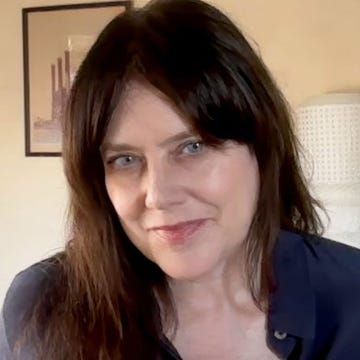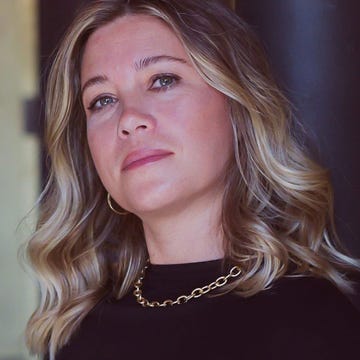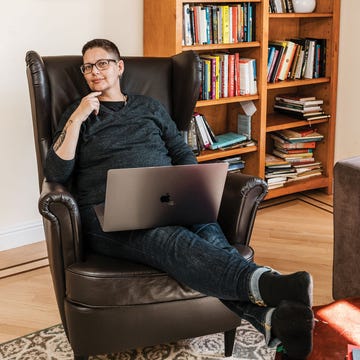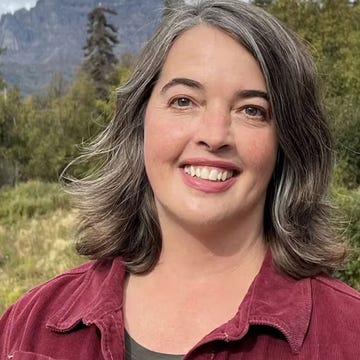Emma Pattee remembers the instant her first novel, Tilt, came into shape for her. As so often happens when it comes to inspiration, it began with the most ordinary of events. It was 2019, and Pattee was pregnant with her first child. A resident of Portland, Oregon, she had long been anxious about the possibility of an earthquake in the Cascadia Subduction Zone. This is a fault system that stretches from Cape Mendocino, in Northern California, to Vancouver Island and features a “triple junction”—where three seismic plates come together. The last time such a quake occurred was January 26, 1700; the estimated magnitude was between 8.7 and 9.2. It is an understatement to suggest that the next one is overdue.
For Pattee, pregnancy kicked her concerns into overdrive. “I would lie in bed at night,” she recalls on a recent Zoom call, “and play out in my head what I would do if the earthquake happened, and how I would get water, and how I would try to get across the river. And what if the hospitals weren’t working? I would google videos of people giving birth, alone in the woods. It was an authentic fear.”
Then, a few weeks before she was due to give birth, Pattee was at IKEA when the building began to shake. “Oh my God,” she thought. “It’s the earthquake.” In reality, it was simply a large truck backing up into a loading dock, but that was the precipitating incident. “The shaking lasted only a couple of seconds,” Pattee says, “and then it stopped, and the novel appeared almost fully formed in my mind.”
Indeed, Tilt opens in what is essentially a parallel circumstance, as its narrator, Annie, visits IKEA to buy a crib. She is 37 weeks pregnant and it’s the height of summer, and as she waits for a service associate, the earthquake strikes. “For one split second,” Annie observes, “there is movement on both sides of my skin. You, on the inside, giving me the most powerful kick, and on the outside, everything shifting.… Animal fear travels body to body, cell to cell. We all hold our breath at once.… Then the shaking begins.”
The “you” in that passage is the baby in her belly, referred to by Annie as Bean, to whom the narrative is addressed.
That’s a particularly vivid device because it grounds Tilt in both the interior and the exterior: on the one hand, the intimacy of a mother (or mother-to-be) in conversation with the child she is carrying, and on the other, the shock and grief of a collective catastrophe. Pattee emphasizes this tension by shifting back and forth between the saga of the earthquake and an account of all that’s brought Annie to this flash point, beginning 17 years in the past. The strategy is ingenious, creating space for Annie’s backstory to emerge organically throughout the novel in a kind of structural counterpoint. It was also, Pattee acknowledges, something of a happy accident. At first, she had intended to have Annie reflect on her own life as she traversed a devastated Portland, but it was too unwieldy, too much of a stop and start. “For a while,” she says, laughing, “there was a Fitbit, and it was tracking her steps. I went at it every single way.” Eventually, a writing coach with whom Pattee was working advised her to put the manuscript down for a week. “Four days in,” she continues, “I woke up at three in the morning and had the realization that it needed to be like this.”
Tilt is so good in so many ways that it is difficult to cite them all. Reading it is like watching a baseball pitcher throw a no-hit game. There’s the earthquake, of course, and the way it disrupts everything, an idea Pattee makes explicit via all the people Annie encounters and then loses track of, much as she has lost sight of her own life. There’s her marriage to Dom, an aspiring actor just a bit too old to keep on hoping; the night before the quake hits, they fight over an audition he insists on attending in lieu of his shift at a café. Annie has long since given up her own dreams—she was once a promising playwright—to become “the office manager of a big shiny tech company, getting paid $54,000 a year.” It is, she explains, “the largest amount of money I could ever imagine,” although in Portland, where the rents keep doubling, no amount of money can ever suffice.
“All the things we were going to do,” Annie tells Bean. “Your father’s big break-out role, my one-woman show, move to LA and get rich and famous.… Those things sparkle at us from a distant mountaintop.” This is among the most withering, and accurate, assessments I’ve encountered of the pitfalls of the creative life. It’s not enough, in other words, to want it. Everyone wants it just as much. So what happens when you don’t have the luck, or the wherewithal, to make it?
Such a question reverberates throughout the book.
Does that make Tilt a coming-of-age story? In a certain sense, it does. But the most essential turn in the novel has to do not with Annie or Dom’s unfulfilled ambitions but with the child she must keep safe. The earthquake has rendered everything contingent; there is no way to get in touch with anyone. There is only Annie and Bean and the need to get back home. As the book progresses, Annie grows fiercer and fiercer. She begins to stand up in unanticipated ways. “She shows up,” Pattee says, “in a way she can’t do so much in the beginning. She starts off so avoidant, and so much of her head is in the sand.”
The key is Pattee’s recognition that there is no such thing as a safe harbor. There is no happy ending; there is only life. Here, too, we see the strength of this novel, which promises no false resolution. How can it, when the main action unfolds in the hours after the earthquake? Too much is unknown, is yet to be determined—which is, of course, the case with parenthood as well. “I had always felt,” Pattee says about the time before her children were born, “like the thing that had gotten me through was hard work. But with kids, it doesn’t work like that. I literally have no idea how this is going to play out, and there is so little I can even do.”•
Join us on May 15 at 5 p.m. Pacific time, when Claire Vaye Watkins will sit down with CBC host John Freeman and special guest Karen Russell to discuss Gold Fame Citrus. Register for the Zoom conversation here.













